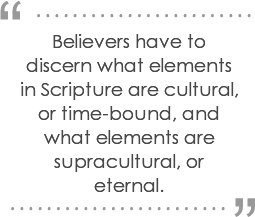Is the Meaning of Scripture in Motion?
 Reprinted with permission from Faith Pulpit (July-September, 2010).
Reprinted with permission from Faith Pulpit (July-September, 2010).
An Evaluation of the Redemptive-Movement Hermeneutic
In the summer of 2007 I had the privilege of leading a group of teens from my church on a missions trip to France. A few weeks before the trip, one of the French missionaries we would be visiting (Denise Nelsen, a 1989 FBBC grad), was stateside and was able to come to our youth group to meet the missions team. Before the meeting, I asked her to greet the teens like she would greet French teens at her church—with a kiss! One by one the teens filed into youth group and were greeted by this strange woman with a holy kiss on each cheek. The shocked and surprised faces of the teens were truly a sight to behold!
Whether this humorous exercise helped prepare the teens for France or not may be debated, but it certainly awakened their understanding of the cultural differences between France and Iowa. In many respects this anecdote represents something at the heart of Biblical hermeneutics—the contextualization of Biblical truth. Contextualization is applying or appropriating Biblical truth into a contemporary setting and culture.1
Each time we modern believers apply the Bible, we consciously or unconsciously contextualize its meaning. For example, the command to greet fellow believers with a holy kiss is found five times in the New Testament.2 These five passages all contain the same direct imperative (aspasasthe), yet I know of no Bible-believing church in the United States that greets people with a kiss at the front door. Are American Christians living in disobedience? Are French Christians applying the Bible more accurately? The answer to both of these questions is “No,” because we intuitively understand that greetings change from culture to culture. The Biblical principle at stake is loving hospitality, not the cultural custom of kissing. While this example of contextualization is fairly straight forward, a multitude of controversial issues faces today’s church.
 Introductory observations
Introductory observations
Discussion